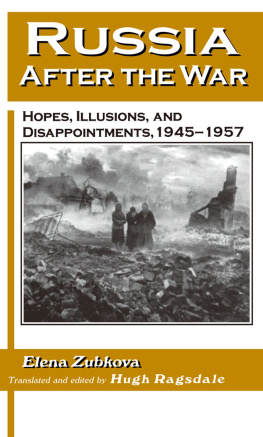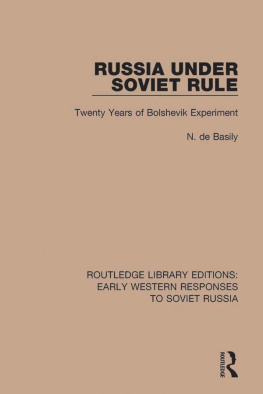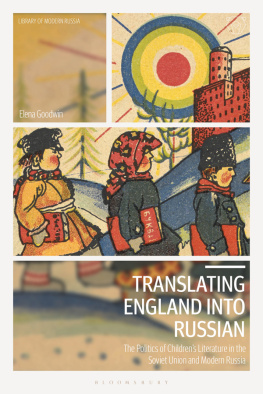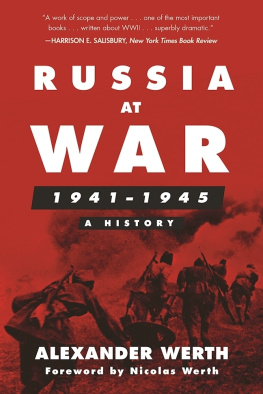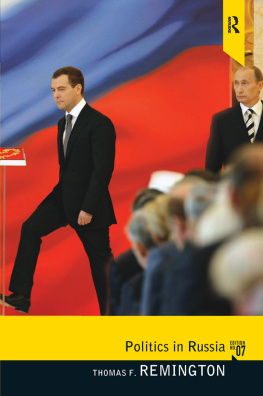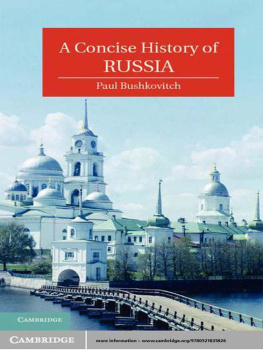RUSSIA
AFTER THE WAR
The New Russian History
Series Editor: Donald J. Raleigh,
University of North Carolina, Chapel Hill
This series makes examples of the finest work of the most eminent historians in Russia today available to English-language readers. Each volume has been specially prepared with an international audience in mind, and each is introduced by an outstanding Western scholar in the same field.
THE REFORMS OF PETER THE GREAT
Progress Through Coercion in Russia
Evgenii V. Anisimov Translated with an introduction by John T. Alexander
IN STALINS SHADOW
The Career of Sergo Ordzhonikidze
Oleg V. Khlevniuk
Translated by David Nordlander Edited with an introduction by Donald J. Raleigh, with the assistance of Kathy S. Transchel
THE EMPERORS AND EMPRESSES OF RUSSIA
Rediscovering the Romanovs
Edited by Donald J. Raleigh Compiled by Akhmed A. Iskenderov
WOMEN IN RUSSIAN HISTORY
From the Tenth to the Twentieth Century
Natalia Pushkareva Translated and edited by Eve Levin
THE RUSSIAN EMPIRE IN THE EIGHTEENTH CENTURY
Searching for a Place in the World
Aleksandr B. Kamenskii Translated and Edited by David Griffiths
RUSSIA AFTER THE WAR
Hopes, Illusions, and Disappointments, 19451957
Elena Zubkova Translated and Edited by Hugh Ragsdale
First published 1998 by M.E. Sharpe
Published 2015 by Routledge
2 Park Square, Milton Park, Abingdon, Oxon 0X14 4RN
711 Third Avenue, New York, NY 10017, USA
Routledge is an imprint of the Taylor & Francis Group, an informa business
Copyright 1998 Taylor & Francis. All rights reserved.
No part of this book may be reprinted or reproduced or utilised in any form or by any electronic, mechanical, or other means, now known or hereafter invented, including photocopying and recording, or in any information storage or retrieval system, without permission in writing from the publishers.
Notices
No responsibility is assumed by the publisher for any injury and/or damage to persons or property as a matter of products liability, negligence or otherwise, or from any use of operation of any methods, products, instructions or ideas contained in the material herein.
Practitioners and researchers must always rely on their own experience and knowledge in evaluating and using any information, methods, compounds, or experiments described herein. In using such information or methods they should be mindful of their own safety and the safety of others, including parties for whom they have a professional responsibility.
Product or corporate names may be trademarks or registered trademarks, and are used only for identification and explanation without intent to infringe.
Library of Congress Cataloging-ln-Publication Data
Zubkova, E. IU. (Elena IUrevna)
Russia after the war: hopes, illusions, and disappointments, 19451957 / by Elena
Zubkova; translated and edited by Hugh Ragsdale.
p. cm. (New Russian history)
Includes bibliographical references and index.
ISBN 076560227X (cloth : alk. paper)
ISBN 076560228-8 (pbk : alk. paper)
1. Soviet UnionSocial conditions19451991. 2. Soviet UnionEconomic conditions19451955. 3. Reconstruction (19391951)Soviet Union.
I. Title. II. Series.
HN523.5.Z8 1998
306.0947dc21
9817042
CIP
ISBN 13: 9780765602282 (pbk)
ISBN 13: 9780765602275 (hbk)
Contents
In contrast to the enormous literature on that most controversial of all subjects of the early postwar period, the Cold War, Soviet internal affairs have received relatively meager attention. What we know of them is little more than a litany of several chiefly ominous events: the forced repatriation of reluctant Soviet military and civilian personnel from Central Europe at the end of the Second World War, the infamous Leningrad Affair (purge) of 1949, the Nineteenth Party Congress of November 1952, and the even more infamous Doctors Plot of early 1953. These two authors were long among the leading authorities on the subject, yet both were compelled to devote the bulk of their accounts to foreign affairs, as there was simply insufficient information on Soviet internal affairs.
If any part of this opaque picture has been more obscure than the whole, it is public opinion. When I told colleagues and Russian migrs that I was translating a book on Soviet public opinion, their nearly invariable response was incredulous: Was there such a thing? they asked.
Fortunately, we now have a substantial remedy for this sad state of affairs. The work of Elena Zubkova is, in the literal sense of an oft-abused word, unique. She is bold enough to attack these two difficult facetspublic opinion and the high tide of Stalinismof this doubly obscure subject at once. If some of her discoveries confirm our expectations, most of them are new and informative. The merest sampler of her subject matter illustrates the point:
Given the brutal male mortality rate during the Second World War, what did young Russian women do for a family life in the postwar generation?
If the government perceived the moral solidarity of veterans (shalmannaia demokratiia) as a threat to its stability, what kind of policy did it deliberately utilize to divide them against each other?
Why did the nearly half million amputees among the veterans have to be re-certified as disabled by a new medical examination every year?
What prompted children to ask parents why Stalin did not order God to send better weather, and what prompted good members of the Communist Party to attend church services to pray for rain?
Why did the government ship grain abroad while tens of millions of Russians suffered malnutrition at home (and 2 million died of it)?
What led the Russian peasants to expect President Harry Truman and Prime Minister Winston Churchill to declare war on the Soviet Union for the sake of abolishing the collective farm?
In the face of the daunting difficulties of their life at home, why did the Russians of this generation take such a lively interest in foreign affairsmore perhaps than we didespecially in such hot spots as Greece and China?
What prompted some Russians to anticipate real democracy and a free-market economy after the war?
How do we account for the juxtaposition after the war of both pious adulation and visceral hatred of Stalin?
What kind of literary discussion evoked such vital interest as to have people climbing the pipes outside the Writers Union in order to listen through a second-story window?
When the doors of the GULAG Archipelago were thrown open in 1953, what impact did the massive release of many brutalized prisoners have on conventional society?
How are we to appreciate the pathos of those prisoners, falsely accused and convicted, later released in the great post-Stalinist amnesty presumably conferring legal rehabilitation, only to find that the stigma of Stalinist suspicion would never leave them?
One of them found bittersweet relief in what might reduce a Western citizen to abject despair.
When will we former convicts, not guilty of anything, ever be fully rehabilitated? I have resolved the question for myself: Never. My fate? My future? It has already been determined. In words: trust. In fact: suspicion. In the hearts of the powers that be: eternal suspicion. But that no longer bothers me. The more important problem is settled: my children can respond without fear on that line in the questionnaires: Who is your father? They can write boldly and honestly: reserve officer, soldier in the Great Patriotic War, communist since 1931.

